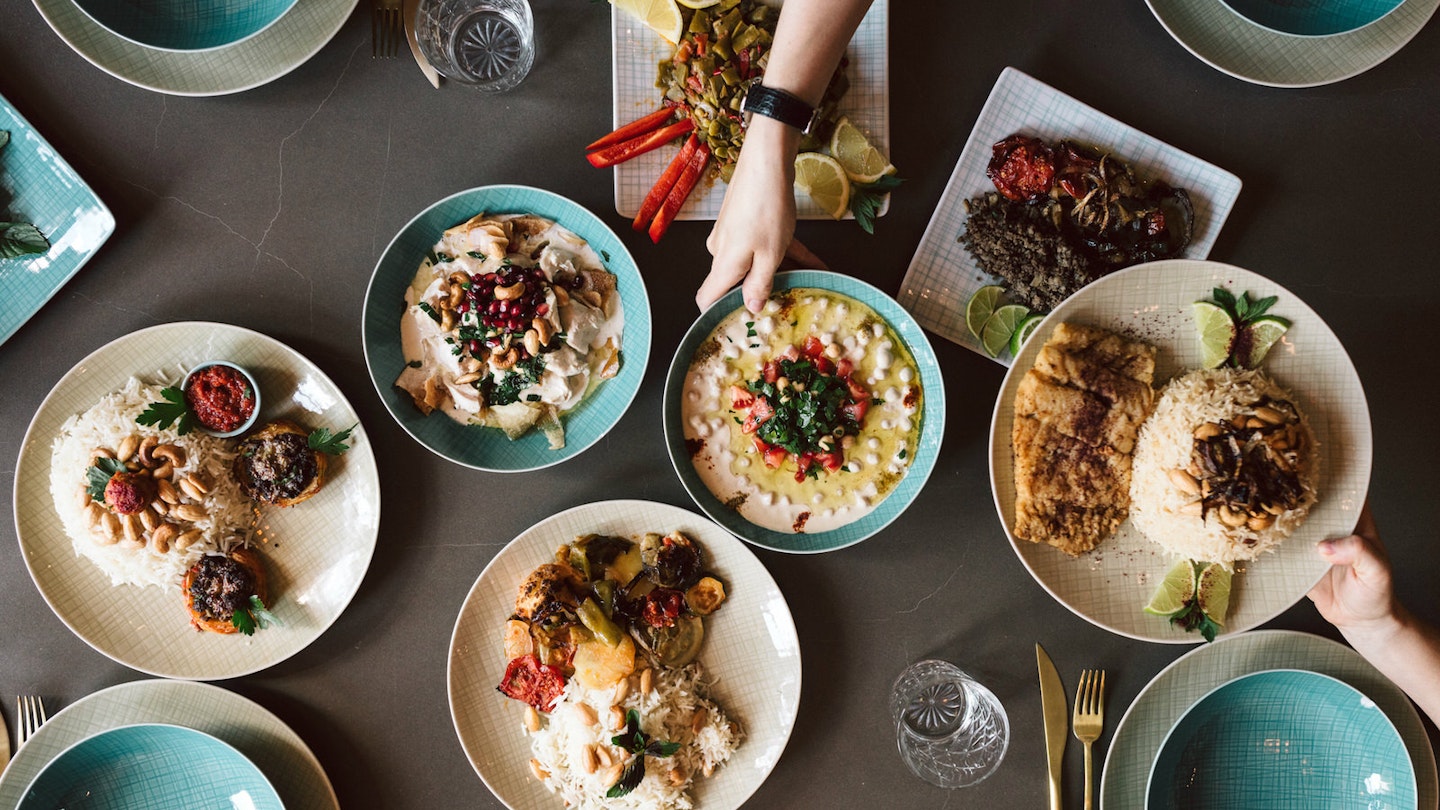Devoted food lovers will travel to the ends of the earth for a good meal. However, have you ever considered the perilous journey some chefs take in order to create it? These restaurants, cafes and food projects from around the world have nurtured the talents of countless refugees and asylum seekers, serving up delicious plates with a generous side of social conscience.
Kreuzberger Himmel, Berlin
Kreuzberger Himmel, a Syrian restaurant, hires recent arrivals from Afghanistan, Syria, and Iraq. One such staffer, Oda Bashi from Syria, claims ‘it’s more than a restaurant. It’s family.’
Moreover, in addition to providing crucial opportunities for people whose employment prospects are challenging in Europe, the project gives diners the chance to meet refugees face to face, fostering greater understanding – not to mention a love of Syrian cuisine. The menu includes fatteh makdous (stuffed baby aubergine with yoghurt and tomato), kubbeh (meat and bulgur dumplings), and freekeh (a type of green wheat grain) with lamb.
Espai Mescladis, Barcelona
Tucked away in Barcelona’s trendy El Born neighbourhood, Espai Mescladis (meaning ‘mixed space’) is run by a local not-for-profit organisation aimed at promoting social cohesion. Its three-month Cuinant Oportunitats (Cooking Up Opportunities) programme trains marginalised individuals to become chefs or waiters. Consequently, the open-air cafe is now run by a graduate of the initiative, Soly Malamine, a refugee from Senegal.
The Espai Mescladis menu is organic, fair trade, and affordable, featuring classic tapas, locally-sourced ice cream, and a much-lauded veggie burger. Apprentice chefs also run family-friendly cooking classes and cultural exchange workshops.
Emma’s Torch, New York
‘Give me your tired, your poor, your huddled masses yearning to breathe free’ – these words, taken from refugee advocate Emma Lazarus’ poem The Colossus, inspire the culinary training programme and restaurant, Emma’s Torch.
By day, the Brooklyn restaurant serves as a classroom for apprentices – refugees, asylum seekers, and survivors of human trafficking from places like Afghanistan, Burkina Faso, and Venezuela. During service, diners enjoy their homework: new American cuisine such as shawarma spiced lamb loin, grilled cauliflower steak, and pistachio bread pudding.
Soufra Food Truck, Lebanon
When life gives you lemons, make labneh. Mariam Shaar has built a successful catering business as a Palestinian refugee in Lebanon. Soufra (meaning ‘feast’ in Arabic) brings together women from the Burj El Barajneh refugee camp outside Beirut to prepare and serve Middle Eastern treats such as dolma (stuffed vine leaves), makrouta (date cookies), and msakhan (chicken and sumac wraps).
Their food truck traverses the capital—find out more on their Facebook page, or catch a screening of the recently launched Soufra documentary produced by Susan Sarandon.
Parliament on King, Sydney
The walls of Parliament on King are adorned with photos of the people who have worked here over the years—a family album of sorts. This bookshop cafe, run from owner Ravi Prasad’s living room, has provided hundreds of refugees with training in hospitality and a welcoming community. Ms ‘H’ from Afghanistan shares, ‘When I came, I came alone. Parliament was like finding home and friends. It is nice to feel like I am needed and that I am a useful person.’
The menu draws from the staff’s culinary heritage, featuring Sri Lankan curries and Burmese noodle dishes. The eclectic space often hosts late-night life drawing classes and crafty workshops, with all proceeds supporting refugee and asylum seeker projects and training.
Syr, Utrecht
Launched in 2016 after a record-breaking crowdfunding campaign, Syr serves Syrian-Arabic dishes with a European twist, such as falafel, bitterballen (deep-fried spiced meatballs), and luscious baklava. This fusion is intentional, with each dish reflecting the merging of cultures in Utrecht and the Netherlands since the arrival of 64,000 new residents from Syria. A handful of these newcomers are now honing their culinary skills and improving their Dutch as Syr chefs and waitstaff.
Migrateful, London
Aspiring chefs can expand their repertoire while empowering refugees with a cooking lesson from the Migrateful initiative. After working with displaced people in North Africa, France, and London, founder Jess Thompson realized that food can help build cultural connections, providing asylum seekers, refugees, and migrants with the tools to build a life in the UK. As a result, many Migrateful alumni even run their own catering companies.
Migrateful chefs come from across the globe, allowing guests to learn to cook cuisine from Ethiopia, Albania, Pakistan, and more. Classes run at various locations throughout London, with private sessions available upon request.
Soufi’s, Toronto
Family-run Soufi’s specializes in two classic Middle Eastern dishes: maneesh (a flavorful flatbread with various toppings) and knafeh (a syrup-soaked dessert). Jala and her family moved to Toronto in 2012 and 2015 respectively, opening their restaurant in 2017 to celebrate their Syrian roots and demonstrate that there’s more to Syria than the devastating scenes often seen in the news. The family employs recent refugees to maintain authentic flavors while supporting newcomers in their transition to a new life in Canada.
1951 Coffee Company, California
Forget where your coffee beans come from – consider your barista instead. Every year at 1951 Coffee Company in Berkeley, 100 refugees, asylees, and special immigrant visa holders receive training to serve excellent brew. The cafe’s exclusive coffee brand is a hit with local caffeine aficionados, and a third location was opened at Berkeley BART station in early 2019 to complement the flagship cafe and college outlet.
Refugee Food Festival, Paris
Today, the Refugee Food Festival is a global movement, originating in Paris. The week-long festival, conceived by two French food journalists after a trip through 18 countries, including Nepal, Cambodia, and Oman, takes place each June. It encourages restaurants to open their kitchens and host chefs from war-torn nations, educating and inspiring through food.
Launched with support from the UN Refugee Agency in 2016, the festival has had a lasting impact, with events selling out quickly, extensive media coverage, and an influx of job offers for participating refugees. Just three years later, the festival expanded to 16 cities around the world in 2019, including debuts in Copenhagen and London.




